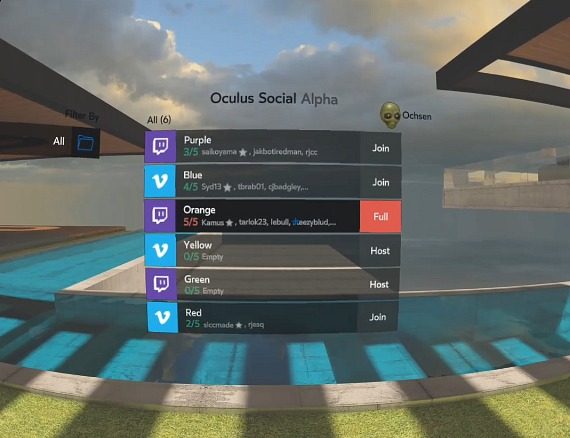Oculus released their first social platform to the world last week, a Gear VR app called Oculus Social that currently connects up to five people to watch shared viewings of Twitch and Vimeo streams. And like Facebook, Oculus’ parent company, there is an official Code of Conduct governing communications on the platform.
While most Facebook users of this day and age likely understand that any text and photos they commit to the company’s website are logged and recorded in some way, the same expectation is unlikely true for Oculus Social.
See Also: Oculus Video Hands-On: Twitch, Vimeo, and Movies Come to Gear VR


Inside the app, players in small groups sit in intimate, closed off rooms in a home—a near metaphor for privacy—and yet the actual level of privacy when compared to a physical incarnation of the same space is drastically different than the expectation thanks to a Code of Conduct which governs these seemingly private rooms.
Oculus Social is a great place to meet and interact with others users in virtual reality. To ensure that you have a great experience, Oculus encourages everyone to treat each other with respect. When engaging in voice chat: You may not use any sexually explicit, abusive, obscene, hateful, racially offensive language, or encourage other users to do so. You may not harass, bully, threaten other users, or encourage other users to do so. You may not impersonate an Oculus employee, partner, representative, or encourage other users to do so. Violating our Code of Conduct will be considered abuse and disciplinary action will be enforced…
What is Abuse? Abuse relates to any violations of our Code of Conduct. If you witness someone acting in an abusive manner (excessive swearing, racial slurs, hateful statements, etc.), please report it to Oculus Support for review… Make sure your report includes the following information:
- Your email address
- A description of what the user said that was abusive
- Your Oculus ID The abuser’s Oculus ID The date of the incident
- The approximate time of the incident (including timezone).
It isn’t clear whether or not Oculus actually has a method of listening in or logging the voice communications happening inside of Oculus Social spaces, or if they will simply lay out “disciplinary action” (we would guess some sort of ban) based on the reports from other users.
Oculus’ code of conduct for now is a quick read in comparison to Facebook’s ‘community standards’ which prohibits a laundry list of things anywhere from selling drugs to nudity. This is likely due to the fact that Oculus has more or less vetted its streaming content for suitability, which removes the remote possibility that anyone might see any lurid material like fully exposed buttocks, or an unauthorized vendor selling Xanax. Since the alpha version only allows five people at a time to connect in a single space, the ability to do too much damage is reduced.
For now the joinable lobbies in Oculus Social lack common privacy settings like Open or Invite-only. But even once these options are added, it isn’t clear that speech and behavior within Invite-only (ostensibly ‘private’) will be any less governed by the Code of Conduct. Facebook has already set a precedent of ‘private’ communications (like singular messages between individuals) being subject to the same standards as public communications within their platform:
If you think someone on Messenger is violating Facebook’s Community Standards, you can also report the message. We recommend that you take a screenshot of the message for reporting purposes.
Personally, there’s something inherently disarming about entering a social VR space. Although still cartoonish, a simple nod of a head can lock you into the reality of the interaction—almost like hitting on some basic dendrite cluster that controls the repetition of ‘pleases’ and ‘thank yous’ formed long ago during preadolescence. I don’t feel this in CS:GO, Rocket League, or any other game that has me on the edge of my seat smacktalking with the best of them. The instant reliance on old social norms is exclusive to my experience with social VR; I feel like I’m there, so I act accordingly.
But when I sit in my private living room with a person watching a film—the experience Oculus is trying so hard to replicate—there is no overarching code of conduct weighing on me, and no reason to modify my behavior. But Oculus Social is not my living room (even if I may actually be in my living room). It’s some abstract controlled space that has the ability to discourage certain behavior by turning us all into potential informants.
In reality, it’s not illegal to have a stupid idea and say it out loud, or to show something risque on your TV, but, depending upon your platform of choice, it may not be allowed in virtual reality.
For now that’s a sort of environment that makes me only slightly uncomfortable. But with Facebook hoping that millions, if not billions, of users will one day be using virtual reality, their vision of the future is one where vast numbers of people are able to have human interactions across distances more easily—but not more freely—than ever.


